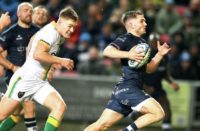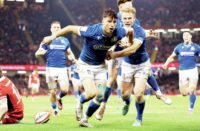 Why is ‘legendary' status conferred on some outstanding rugby personalities but denied others? Who decides these things and how? Does the rugby pubic instinctively recognise and worship the rugby gods or do they take their cue from the media and sponsors who decide independently, and from a slightly different agenda, who the game should lionise?
Why is ‘legendary' status conferred on some outstanding rugby personalities but denied others? Who decides these things and how? Does the rugby pubic instinctively recognise and worship the rugby gods or do they take their cue from the media and sponsors who decide independently, and from a slightly different agenda, who the game should lionise?
The recent publication of John Dawes, The Man who Changed the World of Rugby throws these questions into stark relief again. Amid Wales golden generation – Gareth Edwards, JPR, Gerald Davies, Mervyn Davies, Barry John, Phil Bennett et al – Dawes invariably gets overlooked. Certainly I do not remember any Max Boyce ditties in praise of Dawes or Gren cartoons in his honour.
Yet this is the man who virtually invented modern day 15-man rugby at London Welsh, delivered the 1971 Grand Slam for Wales, captained the Lions to their only ever triumph in New Zealand and then inspired the Barbarians to let rip against the All Blacks.
Oh, and did I mention he also coached Wales' 1976 and 1978 Grand Slam teams. He was absolutely at the epicentre of everything good in that era, statues have been erected for much less, yet how often do we tip our hats in his direction?
The Dawes book was penned 40 years ago by Ross Reyburn off the back of lengthy interviews with Dawes for the Hampstead & Highgate Express – Dawes was lecturing at North London Poly at the time – but at the last minute the original publishers binned the project insisting they wanted a ghosted autobiography, not an objective third person biography.
Reyburn, to his huge credit, refused so the dog-eared manuscript lay gathering dust in a cupboard for decades until now, the 40th anniversary of Dawes retirement and 50th anniversary of his arrival at London Welsh.
Poignantly, only Welsh publishers Y Lolfa Cyf stepped up to the plate – Dawes is still not considered a big enough name elsewhere. History stubbornly refuses to pay full homage to the man from the splendidly named Chapel of Ease, near Newbridge.
There are reasons, sort of, but none totally convincing. Dawes did not fit the heroic, mercurial, West Walian stereotype. He was a solid man of Gwent and proud of it. He also fell out badly with the Press for a while – rarely a good career move – when he coached the Lions' stressful and unsuccessful tour of New Zealand in 1977.

He was out of sorts and the Lions clutched defeat from the jaws of victory. In 1979 there was also well publicised parting of the ways with the WRU – very few coaches of any national team emerge totally unscathed during a long shift at the helm – but his 75 per cent win ratio is comfortably the best in Wales' Test history. It is also worth noting that of Wales' great players only he and Rob Howley, the latter in a temporary role, have even put their heads above the parapet and coached Wales.
Thereafter Dawes went largely underground. While other big names from Wales' golden era appeared regularly on TV, were the subject of documentaries and had their own Press columns, Dawes operated under the radar. When he visited New Zealand for the 2005 Lions tour it was as a stalwart member of the London Welsh male voice choir, not as a pundit. Where once he sprinted onto the great arenas with a toy Lion held aloft, now he shuffled on in blazered anonymity.
“He didn't seek the limelight as a player or an individual, he was a quiet man, in fact I considered that as a title for the book,” recalls Reyburn. “But what he achieved was extraordinary and nothing should detract from that. Reading what I wrote 40 years ago I am aware that I probably underplayed the influence of Carwyn James in New Zealand, but in fairness Carwyn wasn't with Wales in 1971, nor was he at London Welsh for the decade that John transformed them into the most exciting club team in the world. London Welsh didn't have seven British Lions when John Dawes pitched up 50 years ago, it was John's approach to training and playing that ignited the club. Look at the paper cuttings during the late Sixties and early Seventies and they are full of rugby correspondents claiming that the Welsh had just produced the greatest ever club performance and suchlike.”
Dawes was not a glamorous player and his alleged lack of speed is always mentioned, and held against him, although in a fascinating statistical nugget Reyburn has dug out the fact that Dawes recorded 10.2sec for the 100 yards and 51.6 for the 440 on a grass track as a 17-year-old at Lewis School to win their Victor Ludorum prize. As a matter of interest I wonder how many fully professional adult Avia Premiership or Rabo centres could clock those times down at training this week? Directors of rugby should feel free to contact me in confidence with the relevant timings should any of their centres accept the challenge.
What Dawes realised early in his career was that foot speed was of only limited use in attack at centre where even then space was limited.
What wounded the opposition most was speed of passing, when the ball can travel quicker than even an Olympic sprinter. Transferring the ball quickly to your wings who had more space to operate in, and genuine top-end speed, was paramount. The only time you saw Dawes at full pelt was in defence when he made an inordinate number of try- saving covering tackles against opposition runners reputedly much quicker than he.
The London Welsh years were instructive, not to mention exhilarating. The Exiles, with a strong fixture list inherited from glory days in the past, were struggling when Dawes joined them and could not begin to field a competitive pack at that elite level. So what Dawes did was crack the whip and make them into possibly the fittest, fastest, side that amateur rugby ever witnessed.
The Exiles had no midweek rugby so Dawes beasted them early in the week, JPR no less considered these the toughest sessions he endured throughout his rugby career. Using that supreme fitness as the base, Dawes then packed his team with natural ball players prepared to attack whenever in possession.
Give London Welsh 30 per cent pill and they would beat almost any team. They became a glamorous rock and roll outfit, very much of the Sixties, and if you could somehow squeeze into their Old Deer Park ground you rarely left disappointed.
Hard-hitting sports columnist JL Manning, a diehard football man, described a rare visit to Old Deer Park to watch the Exiles beat Llanelli as “the best time I have had since VE Day”.
The recently- departed Cliff Morgan concurred: “The wonderful thing about John Dawes was he inspired people. He brought a sense of adventure and wonder to the game. You had to win with a certain style and that's what London Welsh meant to me. It was a place where you had such fun.”
Welsh rugby was deeply suspicious, however, of a bunch of ex-pat PE teachers, doctors and students who had become the toast of England and Dawes undoubtedly suffered as a result, finding himself in and out of the Wales team while Edwards and Brian Price were both trialled as skippers before the “Big Five” belatedly turned back to Dawes again towards the end of his career.
Could he somehow transfer that London Welsh philosophy and stardust into a Wales team brimful of talent but lacking direction? Could he ever.
John Dawes and Ross Reyburn will be appearing in a Q and A at the Penarth Book Festival at the Pilot pub, Penarth,on Wednesday October 16. Tickets available priced £5.
2 Comments
Leave a Comment
You must be logged in to post a comment.



























Pingback: Obituary: Wales and British and Irish Lions rugby legend John Dawes – UK News
Pingback: Lsm99 เว็บบอล Auto